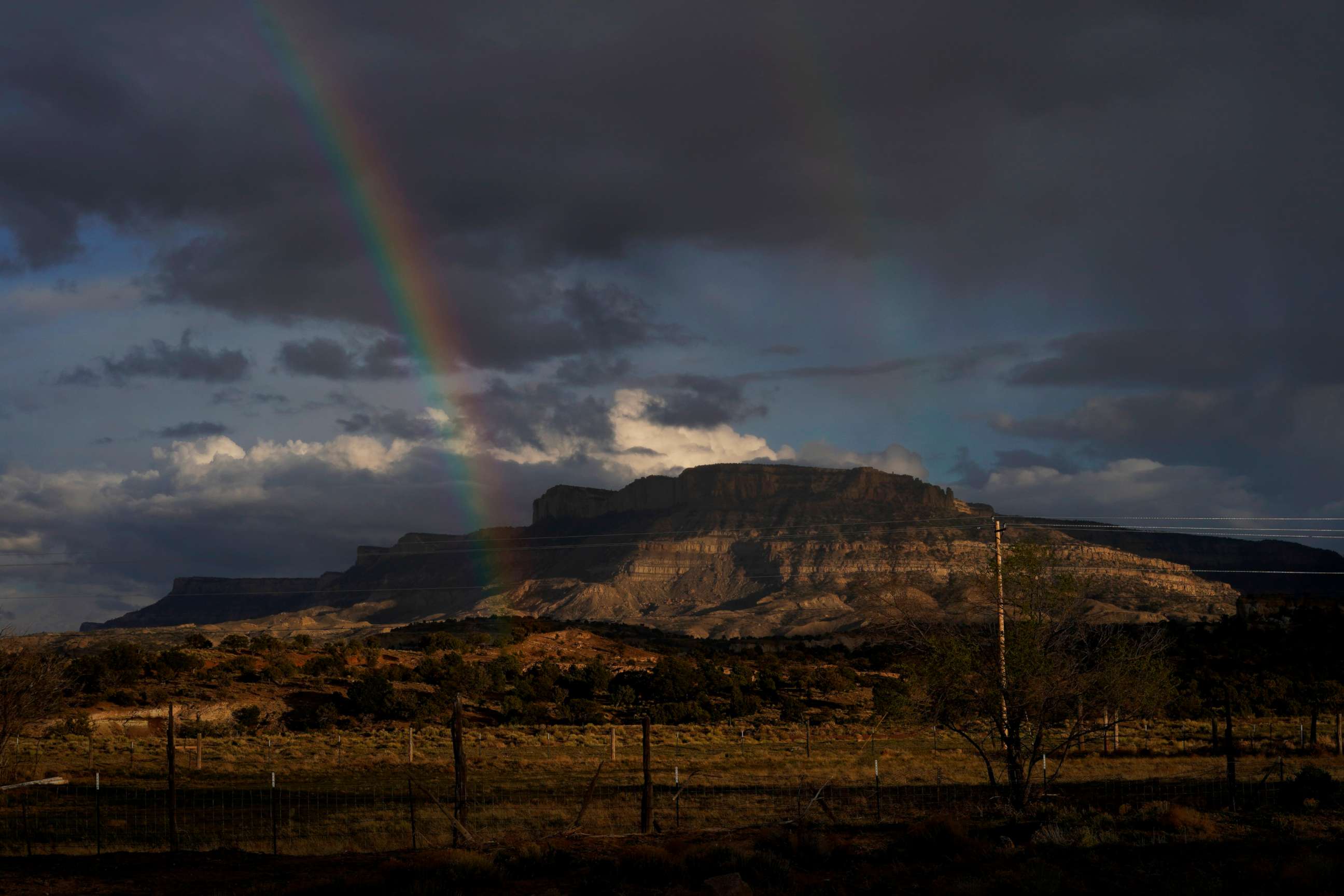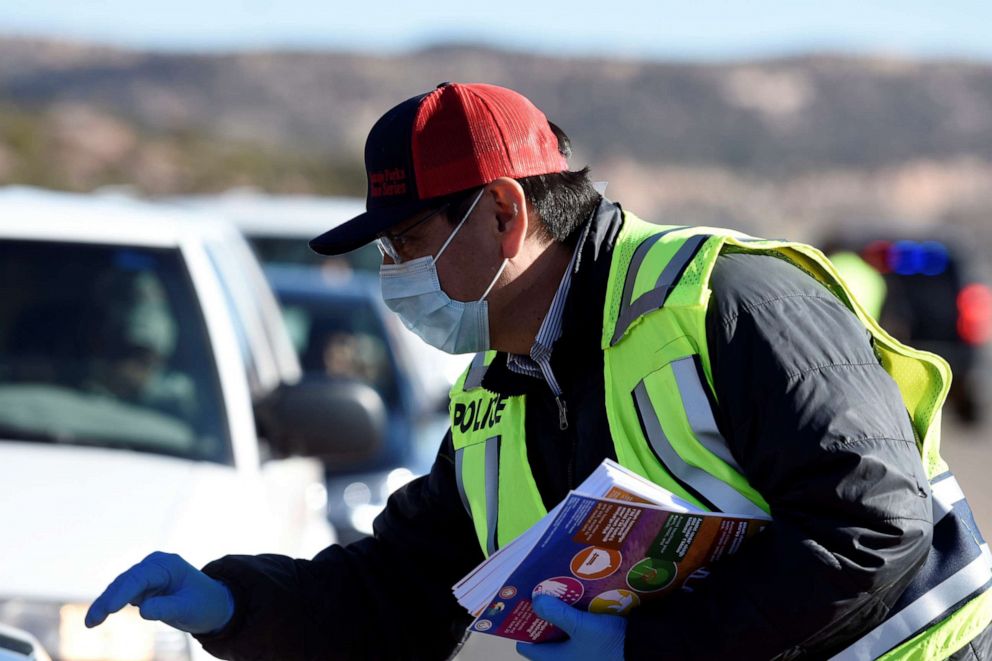Navajo Nation: Where COVID-19 claims whole families
Navajo Nation may have the highest COVID-19 rates in the country.
The only sounds left at the traditional Najavo hut where Dorothy Scott once lived, and her family recently returned, were the notes of the wind chimes and the whines of the puppies.
"Just looking at it is sad," Scott, accompanied by ABC News, said of her former traditional hogan.
COVID-19 ripped apart the family of 11 that had lived in this dwelling.
Three generations of the Scott family had lived on its dirt floors, huddled around its wood stove and sleeping heaped on the jumble of bedding -- or when it was too cold, in the rusting Dodge Durango outside.
Of those 11, eight had contracted COVID-19, several had been hospitalized and two had died.
Scott told ABC News she was standing over the open grave of her son, Bobby Jr., on May 8 when her grandchildren called from the hut: "Grandpa's not breathing."
Bobby Sr., the 6-foot-4 former Navajo Ranger and Dorothy's husband of nearly 45 years, was splayed out on the only bed in the hut.
"The day my dad passed away was the hardest part, because he was home with all the kids, and they had to see that. And they're the ones that called us that their grandpa wasn't breathing. It's really hard because they think about it every night," said Darcy Scott, Dorothy's daughter.

The Scott family is now fractured -- split up in one of the four motels functioning in Gallup, New Mexico, as respiratory shelters. Those not sick enough for the hospital -- which number in the hundreds -- have been set up in these motels.
Percy Anderson, the patient advocate for the family, told ABC News that the Scotts were not the only family in this situation in the Navajo Nation. Anderson has teamed up with COPE to raise money for the Scott family.
"It's very common because, in a lot of these homes, you have up to three generations of people living under one roof: the grandparents, the children and their children's children," Anderson said.
He said the systemic poverty on the reservation and the lack of critical infrastructure made things even more difficult. Their main focus is on survival.
"They're constantly worrying about food, hauling water, getting gas for their generator," he said "It's about taking care of each other, and making sure that everyone is OK."
Dominick Clichee, an epidemiologist at Tsehootsooi Medical Center in Fort Defiance, Arizona, said the Navajo Nation has the highest COVID-19 rates in the U.S. The Navajo reservation is larger than the state of West Virginia and spans parts of New Mexico, Arizona and Utah.
There are more COVID-19 cases per capita in Navajo Nation than in New York or New Jersey, and the peak is nearly a month away. Hospitals are at capacity and some are overwhelmed.
Many families on the Navajo reservation live in multigenerational homes like the Scotts.
In a lot of these homes, you have up to three generations of people living under one roof, the grandparents, the children, and their children's children.
Clichee said it's a long-standing tradition for his people to remain together and preserve their history and heritage.
"There are benefits for that, one of the biggest benefits is passing down cultural knowledge. You have grandparents interacting daily with the toddlers and the children passing that knowledge down to them," he said.
That knowledge, according to him, teaches his people to be resilient in life.
Aaron Price, a Navajo doctor at the Tsehootsooi Medical Center, said his team has been working at the forefront of this pandemic tracing families like the Scotts.
"We actually have identified pockets. Our public health nurses have been out and about in the community, and they're literally able to track if you have one contact that's positive. You literally can almost guarantee the whole household has been infected as well, too," Price said. "We have some of the highest per capita testing in the country. Obviously if you test more, you're gonna find more cases. So I think that will work to our advantage in the long run, because we'll be able to isolate pockets of outbreaks."
Only 40% of residents have electricity and up to 30% lack access to clean running water. The factors leading to the chronic poverty on the reservation are hundreds of years in the making.

"The infrastructure that has been for decades [is] really hard hit here and hasn't been upgraded. The hospital is very old. These are the kinds of things that lead to a lot of otherwise underlying chronic disease and not well-being in the community," said Aylin Ulku, a doctor from University of California, San Francisco who has been treating the Scotts for nearly two weeks.
Ulku is part of a team of doctors working on the reservation alongside the Navajo community health leaders.
"Ultimately it's really trying to be walking alongside this community in solidarity and finding a way to help relieve that worry and that fear," she said.
The efforts to mitigate the damage have been enormous. The Navajo Nation has by far the strictest closure laws in the nation: a 57-hour weekend lockdown, curfew every night, closure of nonessential businesses and a $1,000 fine for violating those ordinances.
Back in the motels rooms, the Scotts and others are strictly confined to their rooms, and because of that strict isolation, matriarch Dorothy hadn't seen her daughter, Darcy, in about a week and Darcy hasn't seen her 3-year-old, Cayden, in a week.
"It's very hard," Darcy Scott said. "I'm really close to my mom and I'm always with her. ... We have nobody to talk to and ... and I don't know, it gets really lonely."
Ulku, who just got back from a stint in Liberia, said she never imagined she'd be practicing motel room medicine in America
"If you had told me three weeks ago I'd be starting elderly patients in a room by themselves without family members supporting them on oxygen, and keeping them in a motel closed up in a room, I would have never believed it. But these are the kinds of things that we're doing to try to keep as many people safe and healing and getting better as possible. So it's creativity. It's teamwork, it's compassion and solidarity," Ulku said.




